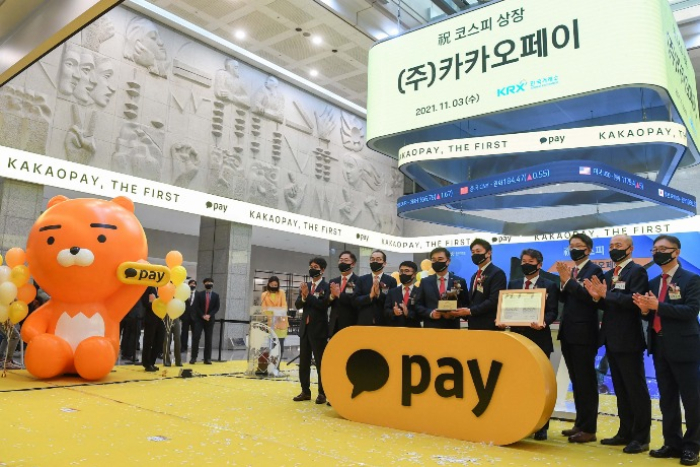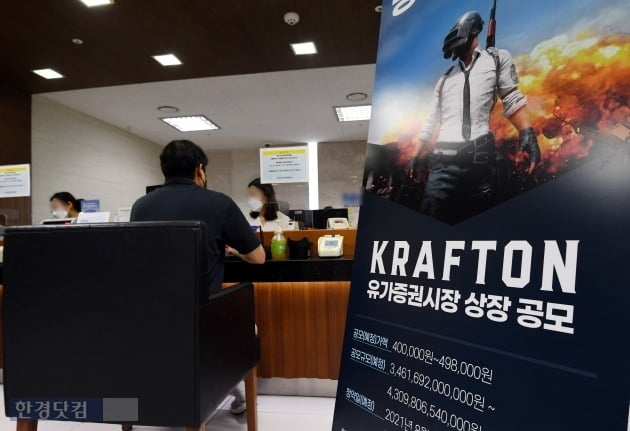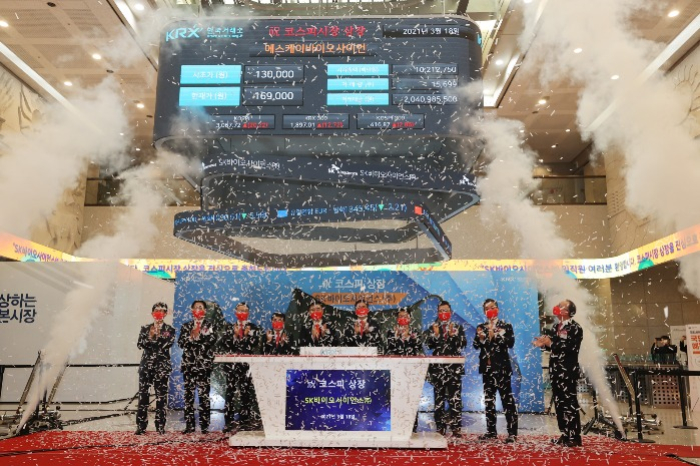IPOs
Korea’s IPO market renews record highs
Thanks to conglomerates' investment in new business and emerging tech growth stocks, new investors flock in
By Dec 27, 2021 (Gmt+09:00)
3
Min read
Most Read
LG Chem to sell water filter business to Glenwood PE for $692 million


Kyobo Life poised to buy Japan’s SBI Group-owned savings bank


KT&G eyes overseas M&A after rejecting activist fund's offer


StockX in merger talks with Naver’s online reseller Kream


Mirae Asset to be named Korea Post’s core real estate fund operator



South Korea’s initial public offering market continues to rewrite history this year.
More than 20 million people have participated in the public offering market so far this year, a whopping 11 times more than the year previous. Thanks to the surge in engagement, companies raked in a record-high amount of 20 trillion won ($16.8 billion) through IPOs.
Helped by ample liquidity and the global stock market boom, returns on public offerings have been in the 50 percent range for two years in a row.
The adoption of an equal allocation system incentivized the unlikely demographic to take interest in the market, such as homemakers and students as young as elementary school kids. Under the system, a company gives the same opportunities to all subscribers as long as a minimum deposit is made.
The equal allocation system was adopted earlier this year after the Financial Services Commission revised the Capital Market Act to increase retail investors’ odds for an IPO allotment. Most of the companies that went public this year adopted both equal and proportional allocation systems.

Public offering for 114 companies this year brought in a record-high amount of some 20.5 trillion won, according to data compiled by Market Insight, the capital market news outlet of The Korea Economic Daily.
The figure is nearly double the previous record of 10.9 trillion won seen in 2010. Until today, 88 companies completed their listings in 2021, excluding special purpose acquisition companies (SPACs.) The arithmetic stock price average for the listings rose 56.7% compared to the closing prices on the first days of trading. Last year's figure was 56.9%.
To put these rates into perspective, the stock price average for the three years from 2017 stood at only 30%.
The equal allocation system exponentially grew the number of subscribers; to reach the aforementioned 20 million. Out of the total, analysts estimate about 1.5 or 2 million retail investors to have habitually subscribed to IPOs this year.
For instance, more than 4.7 million subscribers participated in SK IE Technology Co.’s IPO back in April.
Lim Jae-joon, the Executive Director of Derivatives Market division of Kospi described 2021 as the year that reopened the era of nationwide participation in the stock market. Lim added 10 trillion won used to be known as the barrier; but this year’s IPO market has doubled that threshold.

CONGLOMERATES RUSH TO STOCK EXCHANGE EN MASS
A total of 823 companies are listed on the Kospi as of Dec. 27, up 23 on-year.
Park Sung-won, an analyst with KB Securities Co. said conglomerates rushed to the stock exchange to adapt to the rapidly changing environment created by the Covid-19 pandemic.
“It is worth noting that conglomerates are turning to stock issuance rather than debt in order to finance new business developments,” Park explained.
On the back of the rising popularity of growth stocks, some 17 shares including SK Bioscience Co. surged up to 160 percent this year, compared to the day of their IPOs.
BOOM TO CONTINUE INTO NEW YEAR
Industry insiders forecast the conglomerates' expansion into new businesses and the popularity of growth stocks with retail investors will continue to fuel the IPO market boom for decades.
Many are bullish on the 12.7 trillion won worth of LG Energy Solution, Ltd. shares. The IPO is slated for two days from Jan. 18 for retail investors. Other big kahunas preparing for an IPO next year include Hyundai Engineering Co., ONE store corp., and Kakao Entertainment Corp.
According to Korea Exchange, some 20 conglomerates have requested screening in preparation for going public.
Historically, there have been three IPO booms on Kospi: In the 1970s, when there were two major government interventions in the financial market; in the mid-to-late 1980s when crude oil prices, interest rates, and the value of Korean won were all low; and in the latter half of the 2000s, with a surge in the popularity of installment funds and the emergence of raw materials supercycles.
Experts say the rising interest in IPOs by retail investors and the rapid growth of companies in emerging tech such as AI and self-driving vehicles will lead the IPO market's fourth boom.
(Updated with details on IPO candidates on Dec. 28)
Write to Tae-ho Lee at thlee@hankyung.com
Jee Abbey Lee edited this article.
More to Read
-
 Debt financingKookmin Bank raises $700 mn in forex bonds amid strong demand
Debt financingKookmin Bank raises $700 mn in forex bonds amid strong demandApr 30, 2025 (Gmt+09:00)
-
 Real estateColliers to lead $689 million sale of IGIS Asset-owned Signature Tower
Real estateColliers to lead $689 million sale of IGIS Asset-owned Signature TowerApr 11, 2025 (Gmt+09:00)
-
 Real estateIGIS taps Samjong KPMG, Cushman & Wakefiel, NAI for sale of AP Tower
Real estateIGIS taps Samjong KPMG, Cushman & Wakefiel, NAI for sale of AP TowerApr 11, 2025 (Gmt+09:00)
-
 Travel & LeisureSoftBank-backed Yanolja raises stake in Modetour as No. 2 shareholder
Travel & LeisureSoftBank-backed Yanolja raises stake in Modetour as No. 2 shareholderMar 27, 2025 (Gmt+09:00)
-
 Private equityMBK Special Situations relinquishes Korean investment advisory license
Private equityMBK Special Situations relinquishes Korean investment advisory licenseMar 21, 2025 (Gmt+09:00)
Comment 0
LOG IN


